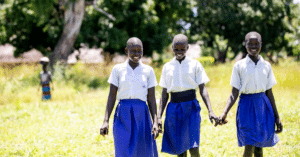Improving Educational Outcomes by Supporting Adolescent Mental Health
As fall approaches, students across the globe prepare for the new school year. This time of year can bring a mix of excitement, anticipation, and stress as they navigate social expectations and external challenges that can severely impact their ability to concentrate on their studies. Food insecurity is a significant concern, with droughts and unprecedented weather patterns leading to strains on agricultural production and worsening food shortages. Students facing inadequate nutrition may find it difficult to focus, impacting their academic performance. In Zambia, the country faces rolling blackouts that disrupt daily routines and access to essential services. For students, this means interruptions in study time and increased stress about falling behind in their education. These challenges can exacerbate existing mental health conditions, but good mental health is crucial for positive educational outcomes and overall well-being.
Depression affects 25% of adolescents in Africa, and while half of all mental conditions start by 14 years of age, most are undetected and untreated. With 40% of Africa’s population under the age of 15, it’s imperative to prioritize early intervention and mental health support to ensure a healthier future for the continent’s youth.For many students, untreated depression leads to poor school performance, chronic absenteeism, and higher dropout rates. The ripple effects of untreated depression can also result in social isolation, reduced motivation for self-care, increased alcohol use, and high-risk sexual behavior, putting youth at risk for HIV and unplanned pregnancies, further hindering educational success. Treating depression in adolescents can have a protective effect—providing self-awareness, improved interpersonal skills, and restored hope and resilience.
We understand the strong link between good mental health and academic success, which is why we partner with Ministries of Education in Uganda and Zambia, as well as NGOs focused on adolescent sexual and reproductive health. We have treated more than 85,000 adolescents since 2019 and we now have more than 200 schools in Uganda with therapy programs and 17 in-school pilots in Zambia.

After receiving therapy, 63% of girls saw improved grades after treatment and 10% of girls who had previously dropped out of school re-enrolled. On average, students attended 4.6 more days of school over a 12-week term and 42% of sexually active adolescents began using contraceptives.
For students like Olipa, therapy reignited her passion to excel academically. While she describes her early childhood as “rosy,” the unexpected death of her father when she was only 11 years old sent her into a depressive spiral that was only compounded by the tense relationship with her new stepfather. “My life is not the same now,” Olipa shares after completing therapy. “I now have an insatiable appetite for the things I never used to. I am now in grade 11, working hard to score 6 points in grade 12 and become a lawyer or a pilot. I am indeed a living testimony of group therapy. Thank you, StrongMinds.”
Olipa is certainly not alone in her experience. Joy, 17, also points to the loss of her father as the time when her depression first appeared. She says she became short-tempered, experienced sleepless nights, and felt worthless. However, Joy’s self-confidence returned when she began therapy sessions. “I was equipped with skills that helped me treat my depression. I learned how to accept my new situation and look to the future again.” Joy, who aspires to become a midwife, says she can now stand strong after receiving support from her mentor and group.
By addressing the mental health needs of adolescents, we can create a supportive environment that fosters resilience, confidence, and academic achievement. By providing these essential services that help students thrive both in and out of the classroom, we are equipping a new generation with the tools to navigate life’s challenges, pursue their goals with determination, and contribute positively to their communities.
